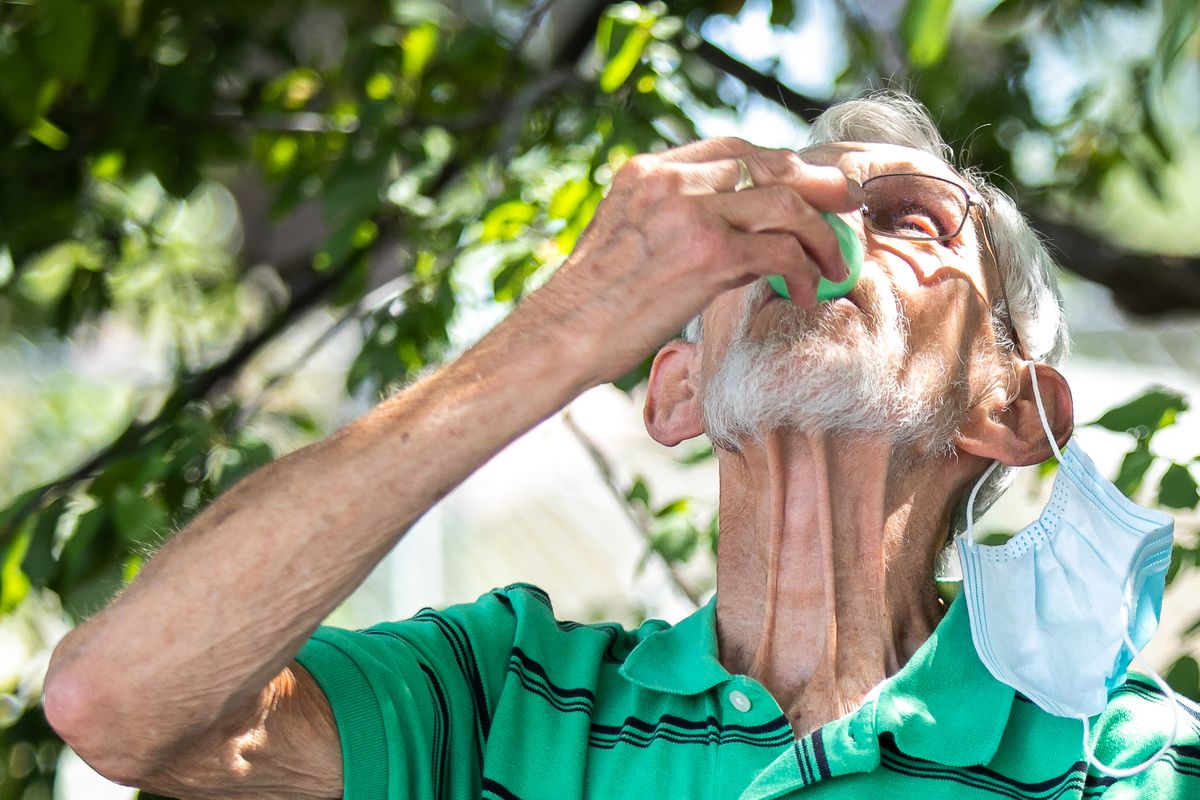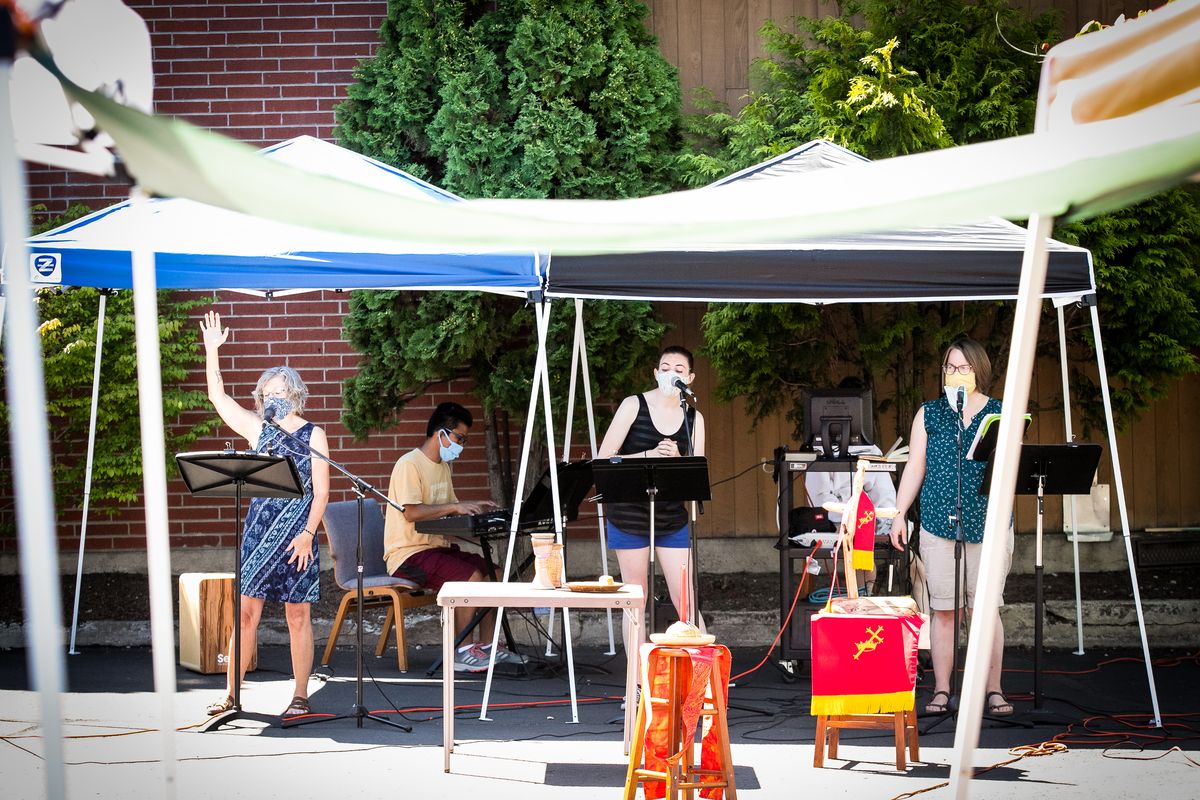‘We do what we can’: Spokane churches work to keep faith communities together despite need to distance

When a small group returns to Bethel African Methodist Church to resume in-person services on Sunday after weeks of holding services online, they will find a form of worship that looks different than most remember.
There won’t be a choir, social distancing will be required, masks will be a must and some familiar faces won’t be in the pews.
While everyone won’t be able to attend and the congregation may not have every element of a church service they are used to, Bethel AME Pastor Lonnie Mitchell said he’s urging his congregation to focus on what they have – and what they are still able to do for each other.
“We’ve been getting through this as best we can,” he said. “When we can’t do what we do, we do what we can, which is serving each other. We’re still praying and we’re still loving.”
As COVID-19 hospitalizations and deaths rise, Bethel AME is one of a number of area churches that have been faced with a difficult choice: stay online and risk isolating or angering some, or adapt to the state’s stringent health mandates and hold smaller, physically distant services.

Churches are currently only allowed to hold in-person services that occupy 25% of the building’s capacity, or include 200 people or fewer, and maintain 6 feet of social distancing between households. Churches are also allowed to hold small group activities in homes if they are under five people.
Mitchell said the church tried to meet together one previous time during the pandemic, but decided to wait due to rising case counts. He said he plans this Sunday to do a shorter-than-usual service that will be attended mostly by church leaders. Those who do come will be asked to sign a guest book so the church can conduct contact tracing if an issue arises.
While Bethel AME and other congregations try to come back together in their houses of worship, most Spokane-area churches are continuing to meet online. A few, however, have been meeting outdoors or are testing other strategies to stay connected while physically distant.
Richie Shaw is lead pastor of Real Life Spokane, which has a congregation of about 1,500 across three locations. Real Life Spokane has been holding online services during the pandemic, and Shaw said leading a congregation with varying views on the coronavirus can feel like walking a “tightrope.” He said people in the church are in a pressurized environment, just like the rest of the country.
“As we listen to our church, there’s people that have fear about the virus, and those (who have) conspiracy theories,” he said. “I’m really trying to lead everybody.”
He said he’s worked to make sure the church stays unified, avoids politicization and keeps the congregation focused on what they can always do – be compassionate and care for one another.
“We have an opportunity to love people no matter what the physical restrictions are,” he said. “You’re not restricted from encouraging people, or helping people grow spiritually.”
He said the church has discussed congregation members watching church services in very small groups in their homes to reduce the isolation many members have experienced, but Real Life Spokane will likely keep most events entirely online for the foreseeable future.
Liv Larson Andrews, pastor of Salem Lutheran Church in Spokane’s West Central Neighborhood, said the church had also run into challenges after meeting online for months.
She said everyone was following the restrictions and was committed to keeping both the congregation and the surrounding neighborhood safe. But many are struggling with isolation and the economic issues caused by the pandemic, she said.
Worshiping in person as a group is also a core part of who her church is, she said, and it’s been challenging to go without.
“One of my leaders put it like this: How far can we stretch our community?” she said. “If you think of it like fabric or dough, how long can you stretch it before it starts to unravel?”
She said her congregation has done what it can to find humor in its situation and to stay connected. Her congregation surprised her with a puppet named “Parishioner Patty” and printed pictures of church members to fill the sanctuary.
In addition to the decorated sanctuary, church members also started a community garden behind the building that’s filled with vegetables and flowers.
“That’s another sign of life,” she said. “We’re not stretched to the breaking point yet.”
While Larson Andrews hopes that small groups can meet outside at some point in the future to pray, many church members are older or immunocompromised, so it may be a while before in-person Sunday services resume, she said.
Many other churches in the area have discussed or have already started outdoor services, including Shadle Park Presbyterian Church, Riverstone Chapel in Spokane and Upper Columbia Academy Adventist Church in Spangle.
Shadle Park Presbyterian has started what it calls “tailgate services” on its property, where church members can sit in their cars or in lawn chairs to watch the services. Those who aren’t in their cars with the windows rolled up must wear masks, and people are only allowed in the physical church building if they need to use the restroom.
Matthew Bell, associate pastor of Shadle Park Presbyterian, said the church had discussed holding services in the sanctuary, but the massive amount of required cleaning and sanitation would have been too much for the church’s staff to handle.
He said the most challenging aspect of the continued closures and social distance requirements is finding a way to safely baptize people. He said at least two people have said they want to be baptized. And if he sent a message out to the congregation letting them know baptism were an option, he said he would likely get many more requests.
“We have not been able to figure out how to perform that sacrament, and that is a wound for us,” he said.
Kevin Wilfley, pastor of Upper Columbia Academy Adventist Church, which serves students and staff from Upper Columbia Academy as well as Spangle residents, said the church was also meeting outdoors.
Wilfley was the pastor at a church in Kirkland at the beginning of the year when the first cases of COVID-19 were diagnosed in the state. He said he stopped doing in-person services before the governor’s requirements out of concern for the health of the congregation. He said he’s taken similar precautions at the Spangle church.
“The last thing I would want is someone come to a service, get sick and maybe die from something that could be prevented,” he said.
He said the precautions weren’t always welcome, but most adapted and everyone in the church has complied with the rules.
“We have to rise above our political preference and do what’s best for others,” he said.
Spokane County Health Officer Dr. Bob Lutz said whatever type of service people choose, they need to take precautions, starting with wearing a face mask.
Places of worship have been linked to nine COVID-19 outbreaks across the state, and Lutz said some people in Spokane who tested positive for COVID-19 said they had been to a church service. He did not identify which services or if the outbreaks had originated at a church.
“(With) the amount of community spread right now, I don’t know who has infections, who is asymptomatic and symptomatic,” he said. “I would err on the side of caution.”
Lutz said meeting outside is safer than meeting inside, but that doesn’t mean requirements like masks should be relaxed. He also said that Phase 2 will likely continue for some time, and if the community wants to move to future phases, they need to social distance and take precautions.
“This is not us trying to persecute,” he said. “We’re just trying to prevent people from getting sick.”